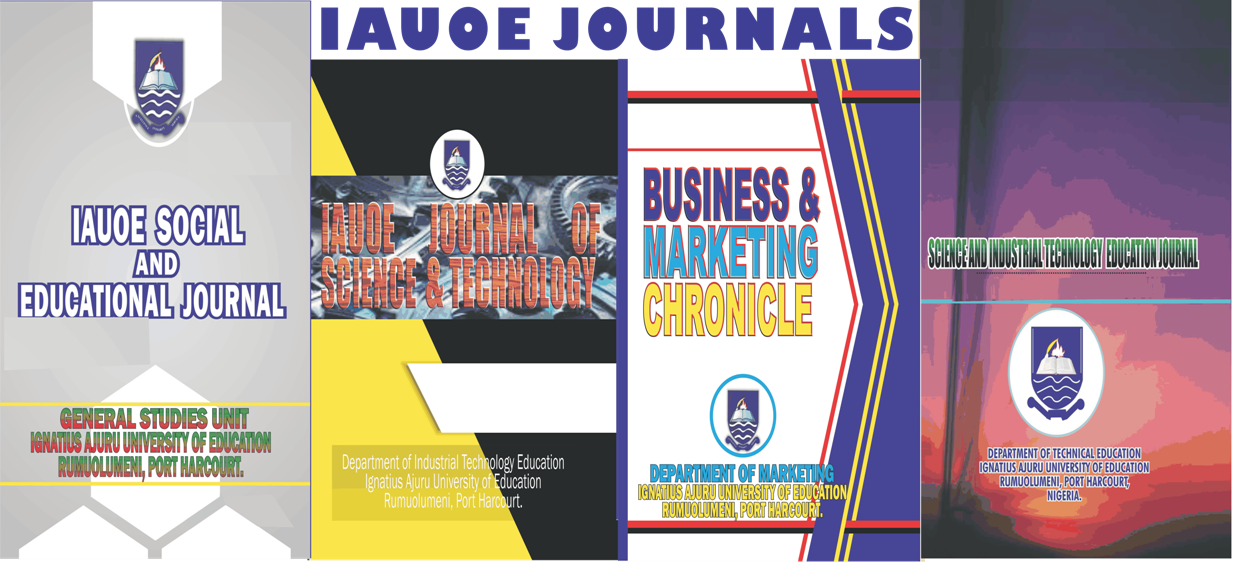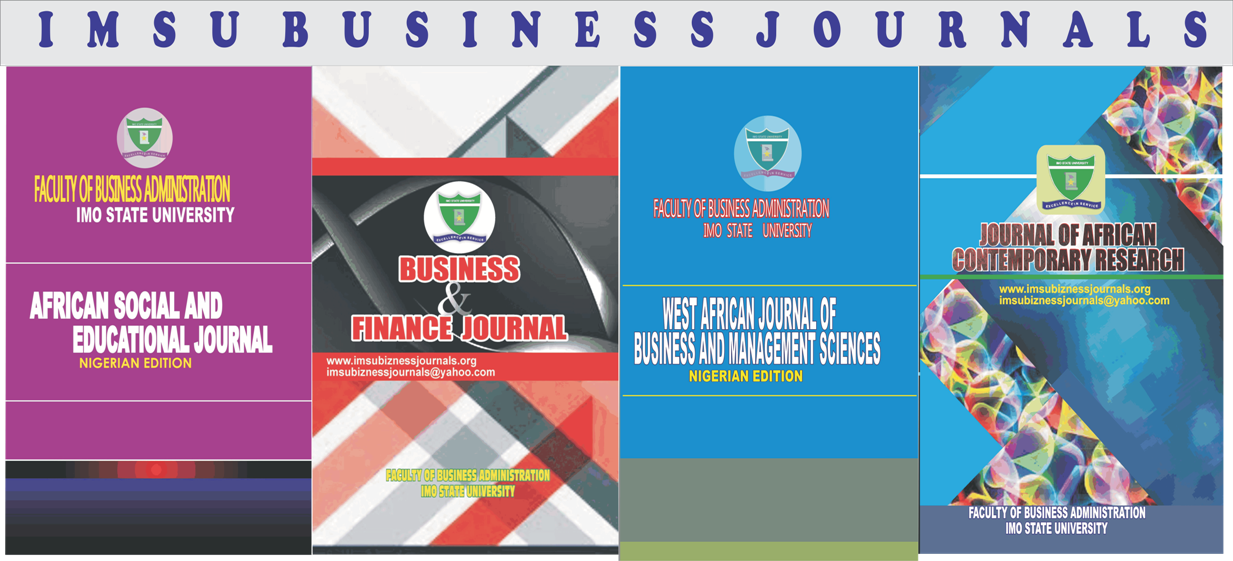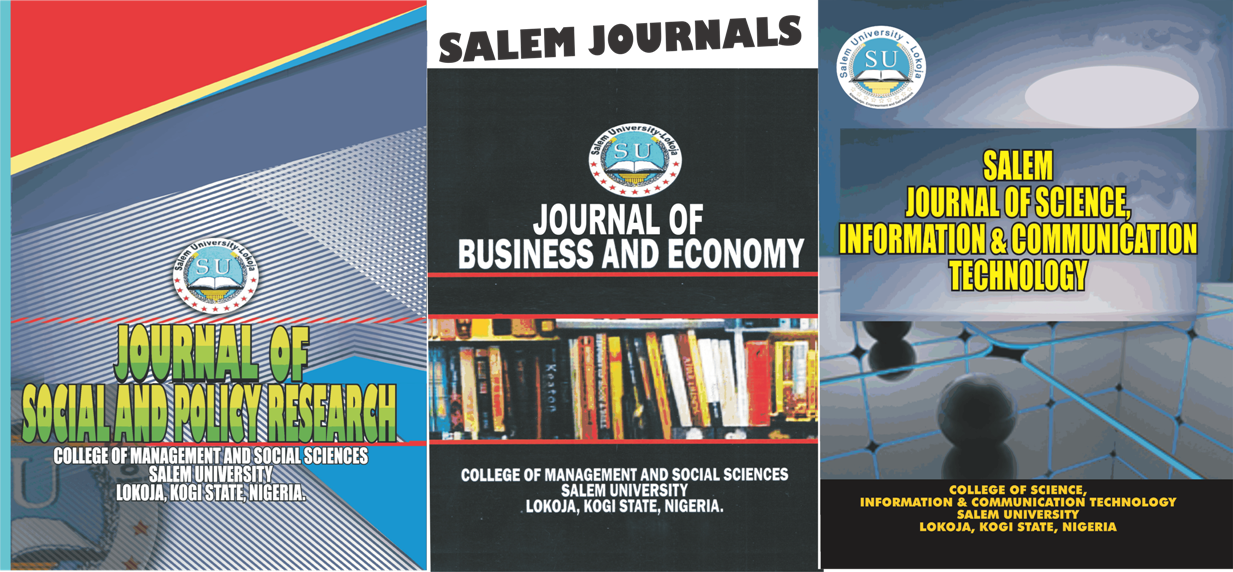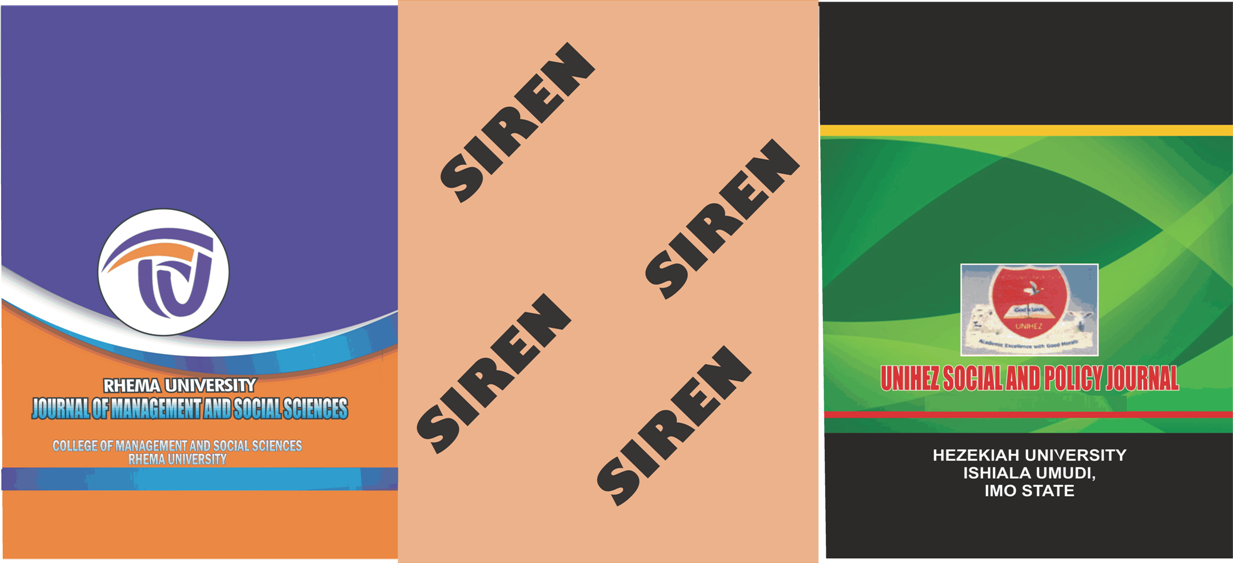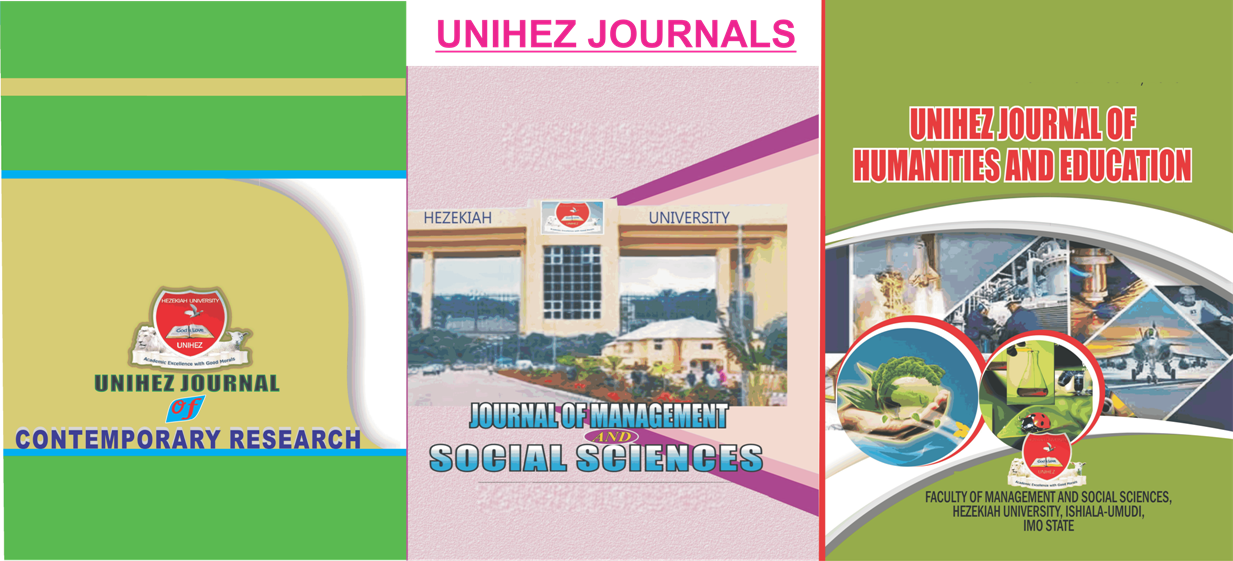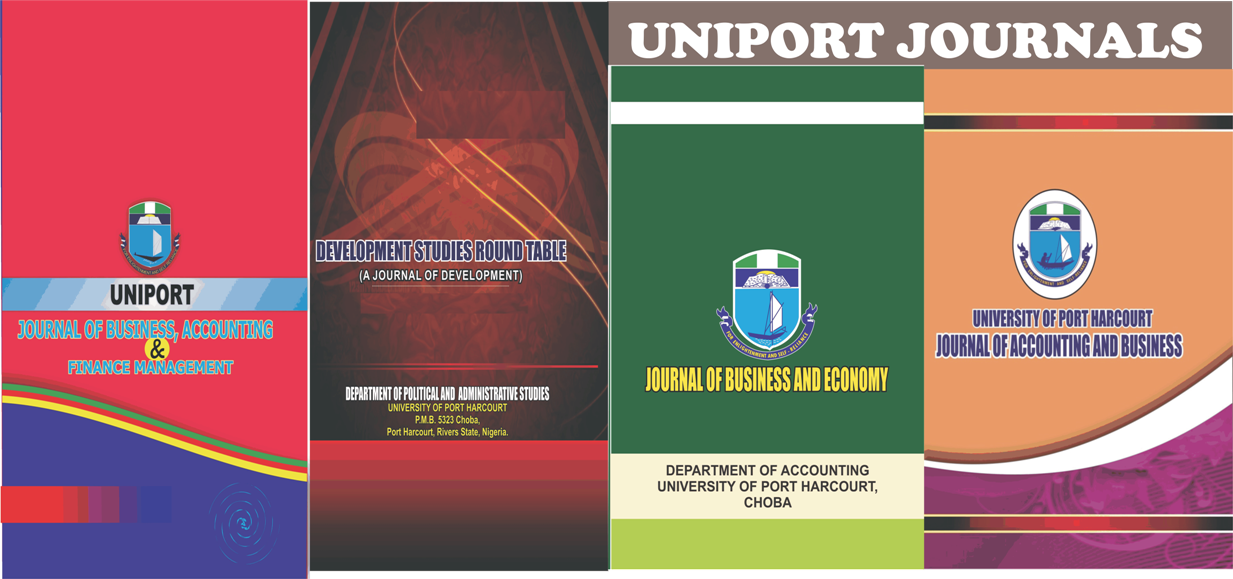2021 Archive
| 1 |
Title: INFORMATION SHARING AND PERFORMANCE OF SMES IN THE HOSPITALITY INDUSTRY IN PORT HARCOURT, RIVERS STATE.pdf Author: Akor, John Abah & E. Kalu PhD. Abstract: Abstract This article evaluates the effects of information sharing on performance of SMEs in the hospitality industry in Port Harcourt, Rivers State. Data were sourced through primary and secondary sources. The article adopted a survey design involving the use of structured questionnaire that was administered by mail, telephone and personal interview on a population of 159 staff of various hotels in Port Harcourt. The data collection instrument was the Customer Relations management and Performance of SMEs (CRMPSMES) questionnaire structured on the likert scale ranging from: Strongly Agree (5), Agree (4), Undecided (3), Disagree (2), Strongly Disagree (1), to measure the independent and the dependent variables. The research instrument was subjected to content validity by giving a copy of the questionnaire to an expert in measurement to validate the instrument. To ensure the reliability of the instrument, 10 copies of the questionnaire was administered to students of university of Port Harcourt. The results so obtained yields Cronbach’s Reliability Alpha of 0.72 and above for each of the variables, implying that the instrument has a strong internal reliability. The multiple linear regressions were adopted to determine the relationships between the cause and the effect of the variables. In conclusion, the analysis reveals that a significant positive relationship exists between information sharing and performance of SMEs in the hospitality industry in Port Harcourt. The implication of this result is that effective information sharing mechanism would bring about effective performance of SMEs in the hospitality industry in Port Harcourt, and as such, it was recommended that SMEs in the hospitality industry in Port Harcourt should evolve an effective information sharing mechanism to boost their performance. View |
| 2 |
Title: DIRECT FOREIGN INVESTMENT AND PERFORMANCE OF MANUFACTURING FIRMS IN RIVERS STATE.pdf Author: Obasse, Victor Joes & B. Chima Onuoha Abstract: Abstract This study is an empirical inquiry into the impact of Direct Foreign Investment (DFI) of other countries into the manufacturing sector in River State, Nigeria. It would lead to a better understanding of the economic mechanism and the behavior of economic agents, both at micro and macro cadre allowing the opening of new areas of study in economic growths. This study would also look through the advantages and disadvantages which foreign direct investment has on Nigeria economy, thereby, reveal if there is a correlation between the direct foreign investment and the Nigerian economy. As a cross section survey, data for this study was generated using well and articulately structured survey from 50 respondents across 10 manufacturing firms in Rivers State. A total of three hypotheses were proposed with analysis revealing the relationship between direct foreign investments and manufacturing sector, it was revealed that direct foreign investment had a positive and significant relationship with manufacturing sector. The researcher believes that if appropriate actions are taken and necessary structures erected, the Nigerian manufacturing sector will be a healthier place to access the benefits that foreign direct investment conveys. This will lead to growth in Nigeria manufacturing sector. It was revealed that in spite of the acknowledged remuneration foreign direct investment conveys. It is nonetheless, criticized on grounds, of the defective activities that foreign investors indulge in. In conclusion, the study showed that the expansion of the manufacturing sector and direct foreign investment in Nigeria is based on a number of problems which may be reason for the positive but insignificant impact on DFI when the variables was regressed against manufacturing sector. It was at that point recommended that, Government needs to do a few needful in order to motivate foreign investors, this is by providing good and right social infrastructure and also a pool of relevant workforce, a safe working environment against militancy and a potentially strong market for their product and services can be sold. Keywords: Direct, Foreign investment, manufacturing sector, Economic development, economic growth, investment View |
| 3 |
Title: EVALUATION OF THE USE OF GOVERNMENT BUDGETARY SYSTEM IN MISAPPROPRIATION OF PUBLIC FUNDS IN NIGERIA.pdf Author: OVIENBOR LUCKY Abstract: Abstract This study is basically concerned with evaluation of the use of government budgetary system in misappropriation of public funds in Nigeria. The primary objective of the study is to identify the problems associated with the budgetary system being practiced in Nigeria. The approach used in this study is review of literature and publications relevant to budget and budgetary control in public sector. First, the study examined the extent to which the government has used the budgetary medium to misappropriate public funds. Second, it investigated the extent to which government agenda has been achieved through the budgetary system. The study found that the current system of budgeting practiced in the Nigerian public sector has failed in achieving any notable success in developing Nigeria’s economy and in improving the standard of living of the citizens. The study therefore concludes that the Nigerian budgetary system lacks true accountability and transparency in government expenditure which public officers have exploited to misappropriate public funds. The study recommends that the government must strive for a progressive and resilient budgetary system which will promote true accountability of public funds and transparency in government spending. The government should also fast track the adoption of the accrual system of accounting in all government Ministries, Departments and Agencies. This will help limit the tendency of theft of government assets and properties. It will also facilitate prudence in government expenditure. Keywords: Budgeting, public funds, accountability, misappropriation, government expenditure View |
| 4 |
Title: COST REDUCTION TECHNIQUES AND PERFORMANCE OF FOOD PRODUCTION COMPANIES IN NIGERIA.pdf Author: Ayodeji Temitope Ajibade & Tunde Muyideen Alabi Abstract: Abstract Food production companies face challenges on cost reduction as their main aim is to reduce cost and maximize profit, but the main constraints facing the companies are the risk of cost used during the operation. The cost of food production increases and lead to certain cost reduction as well as cost control which makes it very difficult for food production companies to operate. The research paper aims to investigate the evaluate the effect of cost reduction techniques on employee satisfaction on the performance of food production companies in Nigeria. The research method adopted was a descriptive survey using primary data and was obtained using a structured questionnaire administered to 161 staff in 15 food production and manufacturing companies. The statistical tools used to analyze the data collected were appropriate to analyze the data collected. Descriptive and inferential statistics comprising mean, standard deviation, correlation, and regression analysis where regression analysis was used to test the hypothesis using STATA statistical software package. The result shows that there is a statistically significant relationship between cost reduction techniques and employee satisfaction with the p-value = 0.000 and the F-statistics (5, 146) = 16.30. Based on the findings, the study recommended that the stakeholders should apply a cost reduction scheme and cost control scheme in their operation and every worker in the organization should be carried along. Food production companies must motivate their employees to achieve the desired goals and objectives. Keywords: Cost control, Cost reduction technique, Employee Satisfaction, Food production companies, Performance, etc. View |
| 5 |
Title: ANALYSIS OF THE INFLUENCE OF MONETARY POLICY ON INFLATION IN NIGERIA.pdf Author: Ogbonna Udochukwu Godfrey PhD. & Ukekwe Chukwudi Emmanuel Abstract: Abstract This research focused on the Analysis of the Influence of Monetary Policy on Inflation in Nigeria, using a time series data of 1980 to 2019. The Autoregressive Distributed Lag (ARDL) model was employed for this study including unit root test which showed both long and short run relationship, using the E-view version 11.0 as the analytical tool. Monetary policy which is the independent variable was proxied by Monetary Policy Rate (MPR), Liquidity Ratio (LQR) and Broad Money Supply (BMS), while inflation was proxied by Rate of Inflation (RoI). The outcome of the analysis revealed that MPR and LQR have a long run relationship with Rate of Inflation (RoI). The BMS from the analysis is insignificant at the long run though there exists a short run relationship between BMS and RoI. It is instructive to note that this study reveals that an increase in MPR increases inflation both at long and short run. This is contrary to the monetary theory which opines that an increase in MPR brings about a reduction in the rate of inflation. The explanation of this could be related to the fact that an increase in MPR affects the amount of money by way of credit in the hands of manufacturers. If money is not available as credit in the hand of manufacturers, it reduces the quantity of products in the market and aggregate demand will now surpass aggregate supply as such triggers demand-pull inflation. The study equally revealed that broad money supply can only influence inflation at the short run and not at the long run.Consequently, the researchers are of the opinion that the Central Bank of Nigeria should do a review of their monetary policy based on the revelation of this study, particularly in the area of Broad money Supply- BMS and Monetary Policy rate. Keywords: Economy, equilibrium, stationarity, non-stationarity, stability View |
| 6 |
Title: THE IMPACT OF HUMAN RESOURCE MANAGEMENT ON THE ATTAINMENT OF ORGANIZATIONAL GOALS.pdf Author: Obasse, Victor Joes & B. Chima Onuoha Abstract: Abstract This study is an empirical inquiry into the impact of human resources management on the organizational performance of Simaro Super Feeds, Port Harcourt. The justifications are based on the significant contribution made by the company to the state economy in terms of employment opportunities as compared to other organizations in River State. HRM practices are limited to issues that are prevalent in Simaro Super Feeds, Port Harcourt. The research strategy used for the research was the empirical survey approach in order to collect quantitative data which was analyzed using descriptive statistical tool. The use of survey enables or enhances generalization to be conducted using findings generated from a sample size which is representative of the whole population. Data collected for this study were classified and presented in tables and weighed in percentage. The percentage here was used to indicate the proportion of respondents in the population with specific responses to a given question. The findings are that Human resource management increased the effectiveness and contribution of employees in the attainment of organizational performance, training and development of employees also had a significant relationship on organizational performance. The study recommended that, organizations should be concerned with how to improve quality of the product, service delivery and customer service by improving the quality and working condition of staff. View |
| 7 |
Title: CRM-BASED TECHNOLOGY AND IMPROVED CUSTOMER SERVICE OF SME’S IN THE HOSPITALITY INDUSTRY IN PORT HARCOURT, RIVERS STATE.pdf Author: Akor, John Abah & Edwinah Amah Abstract: Abstract This article x-rays customer relationship management based technology and improved customer service of SME’s in the hospitality industry in Port Harcourt, Rivers State. Data were sourced through primary and secondary sources, adopted a survey design involving the use of structured questionnaire that was administered by mail, telephone and personal interview on a population of 159 staff of various hotels in Port Harcourt. The data collection instrument was the Customer Relations management and Performance of SMEs (CRMPSMES) questionnaire structured on the likert scale ranging from: Strongly Agree (5), Agree (4), Undecided (3), Disagree (2), Strongly Disagree (1), to measure the independent and the dependent variables. The research instrument was subjected to content validity by giving a copy of the questionnaire to an expert in measurement to validate the instrument. To ensure the reliability of the instrument, 10 copies of the questionnaire was administered to students of university of Port Harcourt. The results so obtained yields Cronbach’s Reliability Alpha of 0.72 and above for each of the variables, implying that the instrument has a strong internal reliability. The multiple linear regression was adopted to determine the relationships between the cause and the effect of the variables. In conclusion, the analysis reveals that a significant positive relationship exists between incorporating CRM-Based technology and performance of SMEs in the hospitality industry in Port Harcourt. The implication of this result is that incorporating CRM-Based technology would bring about effective performance of SMEs in the hospitality industry in Port Harcourt, and as such, it was recommended that SMEs in the hospitality industry in Port Harcourt should incorporate CRM-Based technology to boost their performance. View |
| 8 |
Title: PRACTICES OF INTERNAL CONTROL AND FINANCIAL PERFORMANCE OF SELECTED COMPANIES IN NIGERIA.pdf Author: Amah, Cletus O. PhD. & Ogbonna, Gabriel Nkwazema PhD. Abstract: Abstract This study empirically investigated the effect of practices of internal control on financial performance of selected companies in Nigeria. The study made use of both primary and secondary data extracted from the annual reports and Accounts of companies and Nigerian stock exchange statistical bulletin, textbooks, journals and internet publications. The Statistical Package for Social Sciences (SPSS) was used to evaluate the data which revealed that the six hypotheses tested showed significant relationships between the proxies of the independent variables and those of the dependent variables. In view of these findings, this study concludes that internal control practices influence the financial performance of selected companies in Nigeria. Based on the findings and the conclusion, the study recommends that management’s controls, supervision and segregation of duties should be regularly reviewed and improved upon in order to reflect the current realities and should be used to achieve organizational financial performance objectives. In addition, adequate training and retraining of employees on the job should be encouraged to keep them abreast of every new development in the field of internal control practices as they affect financial performance of the organizations. Keywords: Internal Control Practices, Management Controls, Financial Performance View |
| 9 |
Title: THE ROLES OF INTERNATIONAL ORGANIZATIONS IN COMBATING COVID-19 PANDEMIC DISEASE IN NIGERIA.pdf Author: MBA O. UKOHA PhD. Abstract: Abstract COVID -19 pandemic disease is a deadly disease that ravaging the whole world. Covid-19 erupted in a city named Wuhan in China in the year, 2019. The disease has spread quickly not as it were in China, but more over around the world. Due to the outbreak of Covid 19 pandemic disease, different nations including Nigeria where faced with numerous challenges and assistance where also rendered by international organizations to tackle the scourge. This paper therefore explores the roles of international organizations in combating Covid 19 pandemic disease in Nigeria. In order to ascertain a conscientious work, this paper relied on secondary sources of data collection. Information was sourced from published books, journal articles and conference papers, technical reports from international organizations that anchored on the phenomenon under investigation. The paper concludes with recommendations which include that, there is need for Nigerian government to continue to maintain its relationship with international organizations by ensuring strict coordination and corporation as this would enable Nigeria to receive assistance from the organizations when the need arises. Key words: COVID-19, disease, International Organizations, Roles, Nigeria. View |
| 10 |
Title: IMPACT OF INTERNALLY GENERATED REVENUE OF STATES AND FEDERAL GOVERNMENTS ON ECONOMIC GROWTH IN NIGERIA (2007 TO 2019).pdf Author: OGBONNA UDOCHUKWU GODFREY PhD. Abstract: Abstract IGR is a major indicator of economic growth. In Nigeria, State and Federal Internally Generated Revenue (IGRs) contribute to economic growth. However, both State and Federal IGRs have continued to experience serious downturn and upturn. Such inconsistencies have continued to hinder effective economic growth. This study therefore is aimed at analyzing the impact of Nigeria’s IGRs on GDP in relation to inconsistent growth of IGRs experienced across the six (6) geo-political zones. The study was carried out using data from CBN bulletin on GDP and National Bureau of Statistics for IGR from 2007 to 2019. A multi regression analysis was carried out to determine the impact of IGR on GDP while a one way anova test using SPSS software was employed to ascertain the respective impact made by the geo-political zones on GDP. Results show that IGR and GDP are highly correlated at 0.963 with state IGR being significant at 0.05 levels. In addition, it was observed that the geo-political zones exert different impact on Nigeria’s GDP with some having equal mean and similar impact confirming indeed the negative effect of inconsistent IGR’s growth on Nigeria’s economy. View |
| 11 |
Title: TRANSACTIONAL LEADERSHIP AND WORKERS PRODUCTIVITY IN OIL COMPANIES IN RIVERS STATE.pdf Author: Korubo, Intiedukoba Barry & Sunny Igwe PhD. Abstract: Abstract The study examined the influence of transactional leadership and workers’ productivity in oil companies in Rivers State. The study used five (5) International Oil Companies (IOCs) operating in Rivers State. Primary data via the use of well-structured research questionnaires served as the main tools of data collection. 111 questionnaires were issued but 100 were retrieved and analyzed using multiple regression technique. To ensure that the research instrument is well fitted and reliable, we subjected the research instrument to normality test and Cronbach’s alpha tests. The normality test reported that the target variables are within the acceptable region of +1 to -1. Meanwhile, the Cronbach’s alpha test with an average value of 0.933 affirmed that the research instrument is consistent and internally reliability. From the result of analysis, the multiple regression showed that transformational leadership style, exhibited positive significant influence on workers’ productivity Premised on this, the study concluded that optimal transactional style enhances organizational performance (effectiveness) and it is hereby recommended that oil companies in Rivers State should employ the leadership style as a means of enhancing workers’ productivity. View |
| 12 |
Title: FORENSIC AUDIT AND FRAUD PREVENTION IN NIGERIAN PUBLIC SECTOR.pdf Author: DEBEKEME BOYELAYEFA Abstract: Abstract Fraud is a global threat to public institutions and economies of the world. Preventive efforts in previous studies proved illusive as occurrences are on an escalating magnitude. In response to the above, this study is to investigate the relationship between forensic audit and fraud prevention in Nigerian public sector. The field survey research design was adopted for this study. The operant conditioning theory lent credence to the study. Three research questions and hypotheses were formulated. The study population was limited to an accessible population of Nine (9) Federal Ministries, Departments and Agencies in Rivers State. Secondary data were collected for this study and analyze with Augmented Dickey-Fuller (ADF) stationarity unit root test. The statistical tool, Multiple Regression Analysis with the aid of econometrics view version 10 was used to test the stated hypotheses. The results analyzed revealed that forensic audit report (FAR) is positively and significantly related to fraud prevention with positive coefficient β = 0.152520, t-statistic = 0.243268 and p-value=0.0159 less than ( View |
| 13 |
Title: IMPROVING THE FINANCIAL PERFORMANCE OF OIL & GAS INDUSTRY FIRMS IN RIVERS STATE, NIGERIA.pdf Author: Omoruyi Aimuamwosa Eke & Prof. B.C. Onouha Abstract: Abstract This Study examines the impact of Security Management Systems on the Financial Performance of Oil & Gas Industry Firms in Rivers State, Nigeria. The research design utilizes a management tool: Financial Performance and uses it to measure the criterion variable: Organizational Performance. The bulk of financial data analyzed is aggregate company financials and projections collected mainly from open sources; including various local and international journals and Nigerian government declaration of revenue and tax receipts from the Oil & Gas industry. This is so, as the Oil & Gas firms are private Organizations whose financials are not published publicly. Supporting non-financial data analyzed is collected through the issue of questionnaires to respondents selected from amongst staffers of the various firms using random sampling technique. The representative sample population for the Study are 387 staffers randomly selected from six (6) Oil & Gas companies in Port-Harcourt City, Rivers State, Nigeria. These six firms mirror and represent the entire gamut of the industry to a large extent. The representative firms themselves cumulatively have a combined total staff population of some 12,258 persons, or about half the entire workforce of the entire Industry across the country. Spearman’s Rank Order Correlation methodology is used in testing the validity of the seven hypotheses proposed. The Major Finding of the Study confirms a significant positive relationship between Security Policy; Internal Monitoring & Audit; and Management Reviews/Evaluation respectively and Financial Performance of Oil & Gas Industry Firms in Rivers State, Nigeria. This Finding leads to a Conclusion that: setting up or embedding an effective security management system within the Organizational structure of an Oil & Gas firm in Rivers State, Nigeria indeed will have a positive moderating effect on the firm’s Organizational Performance. The Study thus majorly recommends that: firms in the Oil & Gas Industry in Rivers State, Nigeria should make every effort to ensure they have, or setup a robust, cost-effective security risk management team; in order to have an efficient and effective Organizational structure. They are also to make sure that a cogent Security Policy is put in place for each such Organization. These two actions should then be backed up by frequent internal assessments & audits and periodic management reviews/evaluation of the security management system in place. View |
| 14 |
Title: AUDIT INDEPENDENCE AND AUDIT QUALITY LIKELIHOOD EMPIRICAL EVIDENCE FROM LISTED COMMERCIAL BANKS IN NIGERIA.pdf Author: Egolum, Priscilla Uchenna., Okeke, Onyekachi Nath & Ochuka, Esther Abstract: Abstract As Nigeria battles and surges towards breaking loose from the current excruciating economic downturn, the need to maintain investors’ confidence in the capital market through high quality auditing and transparent financial reporting is unequivocally paramount. Based on the agency theory framework, this study examines the connection between audit independence and audit quality of listed commercial banks in Nigeria. The study explores a sample of twelve (12) listed commercial banks for the period between 2010 and 2019. Two measures of audit independence which include joint audit and audit fee were employed as independent variables while audit firm size and return on capital employed were employed as proxy for audit quality and control variable respectively. In this study, logistic regression analyses technique is been applied to evaluate the panel data set that were collated from annual financial reports of the sampled banks. The finding indicates that the practice of joint audit among listed commercial banks reduces the likelihood of obtaining higher audit quality but higher audit fee increases the likelihood of obtaining enhanced financial statement information quality. The study recommends that regulatory bodies such as the Institute of Chattered Accountants of Nigeria (ICAN) may need to reconsider the ongoing campaign for mandatory joint audit, since there are theoretical and empirical projections that it would not enhance audit quality. The study also recommends a careful managerial decision regarding increasing audit fee since it usually has economic implications on firms earnings. Keywords: Audit Quality Likelihood, Audit Independence, Logistic Regression, Joint Audit View |
| 15 |
Title: JOB SATISFACTION AND CUSTOMER FOCUS OF MOBILE TELECOMMUNICATION FIRMS IN RIVERS STATE.pdf Author: Hamilton-Ibama, Edith-Onajite Lolia (PhD) & Simeon Baratuaipere (PhD) Abstract: This study examines the relationship between job satisfaction and customer focus of telecommunication firms in Rivers State. The study adopted the cross-sectional survey in its investigation of the variables. Primary data was generated through structured questionnaire. 15 copies each of the research questionnaire were administered to employees of the 4 major G.S.M firms in Rivers State making 60 respondents. 58 copies were retrieved and used for the analysis. The hypotheses were tested using the Spearman Rank Order Correlation Coefficient and the moderating variable Partial Correlation with the aid of Statistical Package for Social Sciences Version 25.0. The study findings revealed that there is a significant relationship between the two dimensions of job satisfaction and customer focus of telecommunication firms in Rivers State. The study concluded that there is a relationship between job satisfaction and customer focus. The study recommends that telecommunication firms in Rivers State should create a strong and positive relationship with its employees and direct them towards task fulfillment if the employees are not satisfied with their jobs and not motivated to fulfill their tasks and achieve their goals, the organization cannot attain success. Keywords: Job Satisfaction, Customer Focus, Telecommunication, Pay, Organizational Commitment. View |
| 16 |
Title: DEPOSIT MONEY BANK CREDIT AND AGRICULTURAL SECTOR IN NIGERIA.pdf Author: Nwiado, Deebii (Ph.D.) & Onu, King Ezebunwa (Ph.D.) Abstract: This study investigates the impact of deposit money bank credit on the agricultural output in Nigeria in the past forty-one (1981-2021) years. Four variables: Agricultural Output (AGO), government expenditure on agriculture (GEXA), interest rate (INT) and Exchange rate (EXR) are tested using descriptive statistics and export facto research design. Agricultural Output (AGO) is the dependent variable, while government expenditure on agriculture (GEXA), interest rate (INT) and Exchange rate (EXR) the independent variables. Secondary data sourced from CBN statistical Bulletin and Nigeria Bureau of statistics provide the data. Descriptive statistics and ordinary least squares (OLS) multiple regressions analysis is employed to find out the effects of government expenditure (GEXA), interest rate (INT) and exchange rate (EXR) on agricultural output. The result of the analysis shows that GEXA and EXR are statistically significant. Against the backdrop of this finding, we recommend that government should increase her financing of agro-based business and initiate policies that encourages money deposit money banks to extend more credit facilities to smallholder famers. There is also the need for government to restructure the educational system in a way that it will lead the youths with capability of self-employment in agriculture. Keywords: Commercial bank credit, Agricultural Sector, Bank lending rate, Government Expenditure on Agriculture, Foreign Exchange Rate. View |
